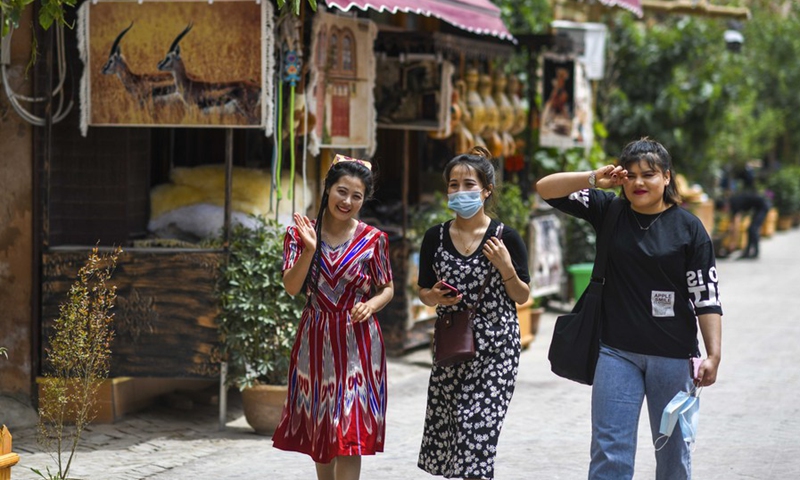Since China shares border with Afghanistan in its Northwest Xinjiang region, terrorist groups that once gathered in Afghanistan, including the East Turkistan Islamic Movement (ETIM), posed threats to China’s national security, senior officials from the Xinjiang regional government said on Monday. They urged the Afghan Taliban to break off with all kinds of terrorism and firmly crack down on them.
The remarks were made in response to questions on whether the changes in Afghanistan will lead to changes in deployments on border control along with border with Afghanistan. “No matter how the outside situation has changed, we will maintain stability and peace,” Xu Guixiang, a spokesperson of the Xinjiang regional government, told a press conference on Monday.
For a long time, the ETIM and other terrorist groups tried to split the Xinjiang region from China through extremism. They incited, plotted and conducted a series of terrorist attacks in Xinjiang, which brought great damage to local residents’ lives and property, Elijan Anayt, another spokesperson of the Xinjiang regional government, said.
The Xinjiang region’s resolution to crack down on terrorism and to safeguard social stability and national sovereignty will not change. Any forces that want to disturb Xinjiang’s development are doomed to fail, said Elijan.
“Terrorism is anti-human and anti-civilization and it’s the common enemy of the international community. We wish that the Afghan Taliban will break off with all terrorist organizations, including the ETIM, and firmly crack down on them in order to help with regional cooperation on security and development,” said Elijan.
Xu said that Xinjiang has taken a series of measures to fight against terrorism and extremism and has had some success. “No matter how the outside situation has changed, we will stick to the overall goal of ensuring stability in Xinjiang, economic development and social prosperity and the happy lives of local residents of all ethnic groups.”
As the chaos unfolded in Afghanistan, some Chinese netizens found out that the movie The Kite Runner was partly filmed in China’s Xinjiang. Xu confirmed that the movie was filmed in Kashi and the Taxkorgan Tajik Autonomous County instead of Afghanistan, since “after 9/11, the US invaded Afghanistan under the banner of anti-terrorism, but ended up destroying the country.”
“It was hard to find a suitable place in Afghanistan to film it, so they chose China’s Xinjiang region,” Xu said.
The Kite Runner, written by Afghan-American author Khaled Hosseini, tells the story of a boy named Amir from Kabul as he navigates the world around him. A world mired in events that stretch from the fall of Afghanistan’s Monarchy through the Soviet intervention, to the exodus of refugees to Pakistan and the US, and the rise of the Taliban.
Xu also displayed two photos taken from the film and said that at the beginning of the movie, the place where Amir’s father is looking at a kite with his teacher is a teahouse in Kashi with more than 100 years of history. The place where Amir and his friend Hassan are playing under a pomegranate tree was in Taxkorgan Tajik Autonomous County.
“Ironically, the US started the war in Afghanistan by using the banner of fighting against terrorism, but the US didn’t do it to help Afghans, it had its own malicious intention. What did it bring to Afghanistan?” Xu asked.
Continuous wars that have caused immeasurable damage to Afghanistan and its people – this is what the US has brought to the country, Xu said. “There wasn’t even a place for filming! But the US ignores the stability of China’s Xinjiang, and only smears it of violating human rights. That’s hypocrisy!”
Local residents walk in a street at a scenic spot in the ancient city of Kashgar, northwest China’s Xinjiang Uygur Autonomous Region, May 16, 2020. Photo: Xinhua



